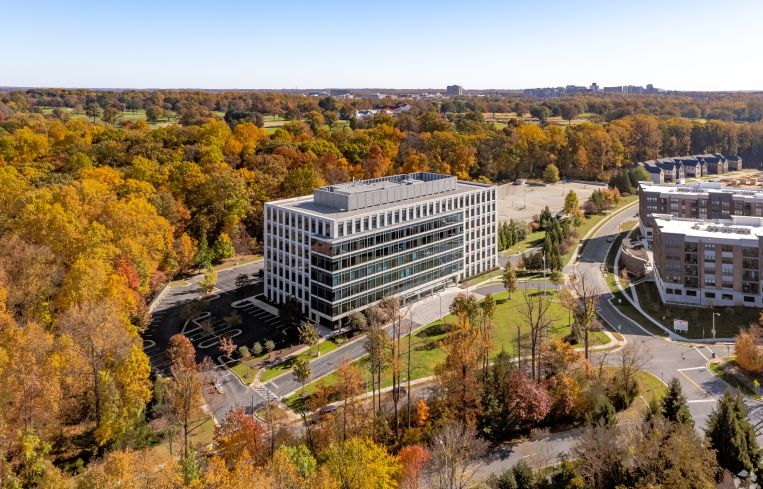Longfellow Completes Rockville Life Sciences Conversion on Spec
By Chava Gourarie April 10, 2024 9:00 am
reprints
Longfellow Real Estate Partners has delivered an office-to-lab conversion in Rockville, Md., in its first project along the Interstate 270 biotech corridor.
Longfellow purchased the 193,570-square-foot office property at 1 Preserve Parkway in 2022 for $42 million, with a plan to reconfigure it to accommodate both office and lab space.
Named Preserve Labs, the seven-story building is meant to cater to life sciences and biotech companies, with two 15,000-square-foot outfitted labs, and five contiguous floors of lab-ready space spanning 155,122 square feet, allowing it to accommodate tenants of varying sizes, said Longfellow’s Greg Capps.
“Rockville is a very established life sciences market with a lot of room to grow, and it’s historically been dominated almost exclusively by one of our competitors,” Capps said. “This was an opportunity to diversify.”
The life sciences developer is in advanced lease talks with several companies, which are looking for anywhere from 10,000 square feet to roughly two floors of space, per Capps, but none of the space is spoken for yet.
Longfellow is already active in most major life sciences markets, with experience in office-to-lab conversions. That background made the property — which was vacant at the time of the purchase — a logical target. “The fact that it was empty made it easy to decide how to reposition it,” said Capps.
After surveying what was being built and when in the market, Longfellow chose to differentiate itself by building spec labs that were slightly larger than the usual deliveries, as well as leaving an option for larger spaces. “Vacancy rates are very low to begin with, lower than every other major life sciences market in the country, so there’s not a lot of large blocks of vacant space,” said Capps.
The building also checked the boxes that the developer looks for in a mid-rise office conversion, including sufficient floor-to-floor heights, floor load capacities, and enough ground-level storage space. “Lab equipment is very heavy, and not every office building is designed for that,” said Capps, adding that it’s not always worth structurally reinforcing a building too fragile to support heavy loads.
The bulk of the work was in preparing the building to accommodate the needs of lab tenants.
“The main buckets were adding shafts and space within the guts of the building to allow for tenants to come in and add the type of equipment and lab systems that they need to support their business,” said Capps.
In addition, the HVAC system needed a significant overhaul to support lab tenants, including specialty exhaust systems and other tenant-specific requirements. The building, too, needed to be outfitted for collecting lab waste and for treatment and sampling ports.
Longfellow also upgraded a 3,800-square-foot fitness center and amenity lounge, with a cafe and a restaurant area.
The company’s chief competitor, Alexandria Real Estate, controls roughly 80 percent of the inventory in the submarket, which is why Longfellow had to carve out a niche for themselves.
“A lot of decision-makers who have companies along the I-270 corridor live on the southern end closer to D.C.,” said Capps. “We saw an opportunity to put some lab space on the market which is not quite in the epicenter of where the lab product has delivered over the last few years.”
Boston-based Longfellow has a portfolio of 16 million square feet of life sciences space in top U.S. biotech markets such as Boston, San Francisco, San Diego and North Carolina, as well as in the United Kingdom.
Chava Gourarie can be reached at cgourarie@commercialobserver.com.


![Spanish-language social distancing safety sticker on a concrete footpath stating 'Espere aquí' [Wait here]](https://commercialobserver.com/wp-content/uploads/sites/3/2026/02/footprints-RF-GettyImages-1291244648-WEB.jpg?quality=80&w=355&h=285&crop=1)
